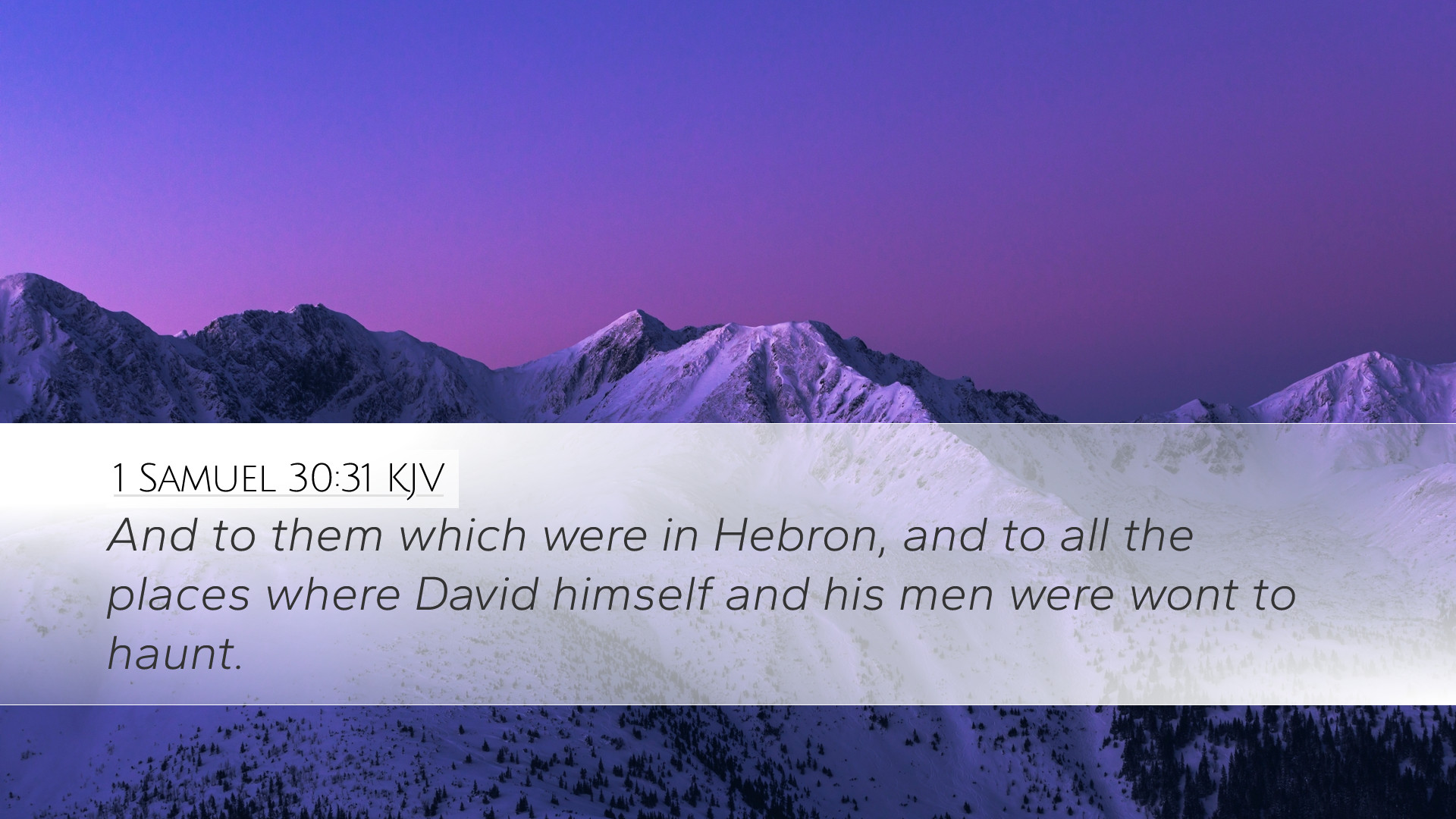Commentary on 1 Samuel 30:31
Verse: "And to those who were in Hebron; and to all the places where David himself and his men were wont to haunt."
Introduction
1 Samuel 30:31 concludes an intensive narrative in which David experiences significant loss and triumph. This verse serves as a pivotal moment that illustrates both the leadership of David and the loyalty he garners from his men. Several public domain commentaries, including those of Matthew Henry, Albert Barnes, and Adam Clarke, provide profound insights into the theological and practical implications of this text.
Contextual Background
Prior to this verse, David and his men had faced a harrowing raid by the Amalekites, resulting in the destruction of Ziklag and the abduction of their families. After deep sorrow, David seeks the Lord's guidance and pursues their enemies. The successful recovery of their families and possessions illustrates divine restoration and potential for leadership. The mention of Hebron in 1 Samuel 30:31 resonates with themes of covenant and kingship, setting the stage for David's future reign.
Theological Insights
-
Covenantal Themes: David’s actions indicate a fulfillment of God's promise to restore and establish him as king (Barnes). The inclusion of Hebron symbolizes a historical significance as it was a stronghold and later becomes David's first capital.
-
Leadership and Loyalty: This passage highlights the bond between David and his men, emphasizing loyalty amidst adversity. Matthew Henry notes the importance of David's role in guiding his followers, drawing attention to the reciprocal relationship between a leader and his subordinates.
-
God’s Providence: The divine orchestration of events leading to the Amalekite defeat is a testament to God's providence. Clarke stresses that the Lord, who led David into battle and provided victory, continues to lead His people today, reflecting God’s unchanging nature.
Commentary Excerpts
Matthew Henry
Henry notes that this verse emphasizes the importance of David’s role in ensuring those who aided him during the raids received recognition. It serves to highlight the principles of justice and reciprocity in leadership—the faithful followers are rewarded. Furthermore, it reinforces the notion that God’s people will ultimately see the fruit of their labor, particularly when following divine guidance.
Albert Barnes
Barnes offers a detailed examination of the geographic references in this verse. He elucidates that Hebron was a city of refuge and a significant location for David’s eventual kingship. The distribution of spoils to the men in this place served a dual purpose: it honored those who fought and re-established authority and unity in David's following. Such acts fortified David's leadership during a time when loyalty was crucial.
Adam Clarke
Clarke's commentary addresses the aftermath of David’s military success. He infers that the people left in Hebron would be aware of the ongoing conflict, and thus by sending gifts, David not only acknowledges them but also reinforces social bonds. Clarke emphasizes the significance of community ties in Israel, where communal relationships were vital for national identity and survival.
Practical Applications
-
Leadership Lessons: Leaders must recognize and reward loyalty and hard work. In theology, this extends to ministry contexts where the contributions of all members are critical, reinforcing community.
-
Endurance in Adversity: The narrative encourages believers to seek God’s guidance in crises and assures them that restoration follows perseverance. Pastors can draw parallels to contemporary struggles faced by congregations and individuals, urging them to rely on God's providence.
-
Community and Relationship Building: This passage inspires a focus on building relationships within the church community. It is a call to action for believers to nurture bonds of support and collaboration, affirming the strength found in unity.
Conclusion
The commentary on 1 Samuel 30:31 offers rich theological and practical insights for readers. By examining David's actions and their implications through the lens of prominent theologians, one finds that this verse encapsulates themes of leadership, community, providence, and divine restoration. In a world filled with modern challenges, the lessons from this narrative stand as relevant reminders of God's faithfulness and the importance of solidarity among His people.


